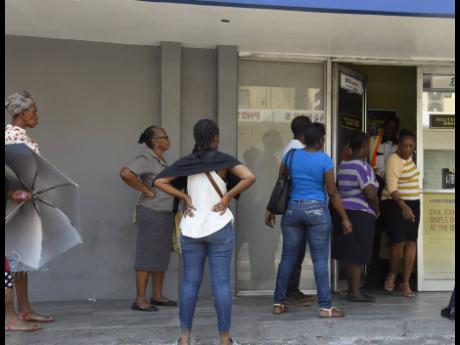Remittance downturn - Financial houses register slump as virus crisis worsens
Jamaica’s second-highest foreign-exchange earner, remittances, could suffer a massive blow this year owing to the devastating effects of COVID-19 on jurisdictions overseas with large diaspora communities.
Signs of a downward trajectory have already emerged, with at least two local remittance companies reporting declines in inflows that have been triggered by lockdowns and job losses in key markets from which remittances flow.
Remittances pulled in US$2.4 billion for the calendar year January to December 2019.
Yesterday, Bank of Jamaica Governor Richard Byles indicated that the Jamaican economy was expected to suffer a huge hit by COVID-19, contracting by about three per cent for the year.
Horace Hines, general manager of Jamaica National (JN) Money Services, told The Gleaner yesterday that the company has already experienced an estimated 25 per cent reduction over the last week and a half as restrictions took effect in New York, The Cayman Islands, and the United Kingdom.
At the same time, Don Wehby, group chief executive officer of GraceKennedy, said that the company’s remittance services’ inbound transaction count has dipped by between five and 10 per cent. However, he said that the company’s digital transactions had increased by close to 20 per cent.
Neither remittance honcho put a dollar figure to their estimates.
Director general of the Planning Institute of Jamaica, Dr Wayne Henry, told The Gleaner that while the agency was expecting a fallout in remittances, the extent of the impact could not be determined at this time.
Commenting further on COVID-19’s impact on JN, Hines said that in Cayman, one of the markets from which remittances flow into the island, the country was in lockdown, and, therefore, Jamaicans there might not be able to send remittances until Saturday.
The state of New York, where large numbers of Jamaicans reside, has become the epicentre of the outbreak in the US, registering 37,258 infections and 385 deaths. The state, which accounts for more than half the total cases in the US, is under strict restrictions, with people ordered off the streets, except for essential workers.
As the United States faced one of the worst economic downturns in its history, congressional lawmakers approved a US$2-trillion relief package, with New York receiving a US$5-billion share. However, governor of New York, Andrew Cuomo, said that the sum did not come close to covering the state’s projected revenue shortfall, which could amount to US$15 billion.
Hines disclosed that JN has had to close most of its locations in the United Kingdom owing to a widespread lockdown there on Monday. He said that JN remittance locations were now operational for only two days in the UK.
He said that the massive lay-offs and decline in earnings, particularly in the hospitality sector where many Jamaicans work, would have a direct impact on remittances.
“In Cayman and New York, the restaurants are essentially closed, except for takeouts, so the tips would not be there anymore. A myriad of things are affecting the industry right now, so while we anticipate a recession, our customers are being impacted by either the restriction on movements as well as job losses and a slowing down of jobs,” he added.
The JN executive said that it would be difficult to forecast when the impact of COVID-19 would begin to wane, noting that Jamaica’s major market in New York, which accounts for the bulk of the remittance inflows into Jamaica, was still at the peak of its curve of the novel coronavirus.
“Right now, we really just trying to see how best we can continue to offer the service based on the environment that we are in and then work towards trying to recover lost sales thereafter.”
Hines urged customers to take the necessary precautions in the wake of COVID-19.
“As best as possible, we will continue to provide the service to ensure that we keep both them and their families connected,” he said.

